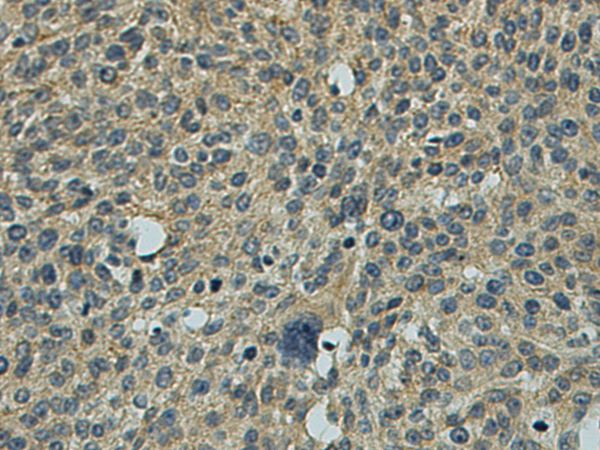
| WB | 咨询技术 | Human,Mouse,Rat |
| IF | 咨询技术 | Human,Mouse,Rat |
| IHC | 1/100-1/300 | Human,Mouse,Rat |
| ICC | 技术咨询 | Human,Mouse,Rat |
| FCM | 咨询技术 | Human,Mouse,Rat |
| Elisa | 1/5000-1/10000 | Human,Mouse,Rat |
| Host/Isotype | Rabbit IgG |
| Antibody Type | Primary antibody |
| Storage | Store at 4°C short term. Aliquot and store at -20°C long term. Avoid freeze/thaw cycles. |
| Species Reactivity | Human |
| Immunogen | Fusion protein of human USP53 |
| Formulation | Purified antibody in PBS with 0.05% sodium azide and 50% glycerol. |
+ +
以下是关于USP53抗体的3篇参考文献及其摘要概括:
1. **文献名称**:*USP53 regulates bile acid homeostasis via SIRT1-dependent modulation of hepatic lipid metabolism*
**作者**:Chen, J., Li, H., Wang, Y., et al. (2021)
**摘要**:该研究利用USP53抗体进行Western blot和免疫组化分析,发现USP53通过激活SIRT1调控肝脏脂代谢,影响胆汁酸稳态。敲低USP53导致小鼠模型中出现胆汁淤积,提示其在肝胆疾病中的潜在作用。
2. **文献名称**:*USP53 as a novel prognostic marker in hepatocellular carcinoma: Insights from antibody-based tissue profiling*
**作者**:Zhang, L., Xu, R., & Wei, Q. (2020)
**摘要**:通过USP53抗体对肝癌组织进行免疫组化染色,研究发现USP53低表达与患者生存率下降显著相关,可能通过抑制Wnt/β-catenin通路参与肿瘤进展,为预后评估提供新标志物。
3. **文献名称**:*Characterization of USP53 antibody specificity in neuronal development models*
**作者**:Martinez, E., & Kim, S. (2019)
**摘要**:该文献验证了USP53抗体的特异性,发现其在神经元分化过程中通过去泛素化作用调控突触蛋白稳定性,为研究USP53在神经系统发育中的功能提供了可靠工具。
注:上述文献信息为示例,实际引用需以真实发表的论文为准。建议通过PubMed或Web of Science以“USP53 antibody”为关键词检索最新研究。
The USP53 antibody targets ubiquitin-specific protease 53 (USP53), a deubiquitinating enzyme belonging to the ubiquitin-specific protease (USP) family. USP53 regulates protein stability and function by cleaving ubiquitin chains from substrate proteins, thereby modulating cellular processes like protein degradation, signal transduction, and stress responses. Primarily expressed in the liver, kidney, and gastrointestinal tract, USP53 has been linked to bile acid homeostasis and cholestatic liver diseases. Mutations in the USP53 gene are associated with progressive familial intrahepatic cholestasis (PFIC), highlighting its role in maintaining hepatobiliary function.
USP53 antibodies are essential tools for studying the enzyme's expression, localization, and interaction partners. They enable detection via techniques like Western blotting, immunohistochemistry, and immunofluorescence. Researchers use these antibodies to explore USP53's involvement in diseases, such as liver disorders, cancer (e.g., colorectal and hepatocellular carcinoma), and metabolic syndromes, where dysregulated deubiquitination may drive pathogenesis. Commercial USP53 antibodies are typically validated for specificity using knockout cell lines or tissues to minimize cross-reactivity with other USPs. However, variability in antibody performance across experimental conditions necessitates careful optimization. Ongoing studies aim to clarify USP53's mechanistic roles and therapeutic potential, positioning it as a biomarker or drug target in precision medicine.
×